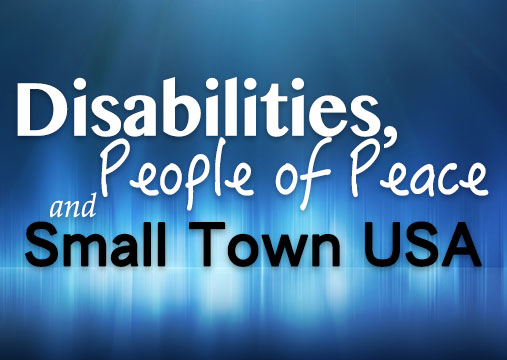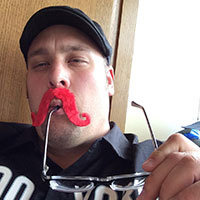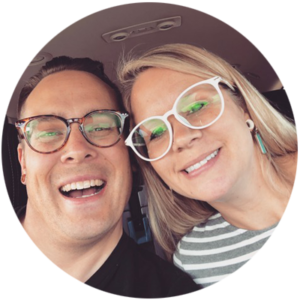Sixteen years ago I was blessed by the birth of my youngest sister. I was twenty years older than her, so I was no longer living at home and I learned of her birth when my dad called me. Being the oldest, and having four other great younger sisters, I was hoping to have a baby brother… but the Lord apparently had a different plan. Five younger sisters! (please pray for me, I’m still recovering from that).
When my dad called me, he said, “Luke, you have another younger sister, she has down syndrome, and her name is Chloe.” Wait. What? She has down syndrome? I remember that I immediately started crying because I had almost no understanding of what that meant other than assuming it was very bad. A week later I flew home to visit my parents and held Chloe for the first time.
Chloe is a gift to my family. And she’s a gift to the world, not to mention the fact that she’s a gift to the Church. Unfortunately the fact that she’s a gift has often been overlooked in her life. When she was born I selfishly viewed her more as a challenge and burden for our family. The society around her is filled with people who view people with disabilities as “retards” (or worse). And what’s worse, many in the Church fail to understand the value of people, especially those with disabilities. In other words, Chloe has something to offer me, you, and the world around us and if churches pay attention, there is a lot that they could learn from these special, wonderfully created, and amazing people.
Disabilities in the Church
I fully intend to write something on people with disabilities and the Church in the coming future that I hope will serve as a Vineyard resource. But that’s down the road so I’ll give you my snap shot thesis right now: the Church must love, value, welcome, and include people with disabilities in its life. It’s one thing to love and value people with disabilities, which Imago Dei demands, and another issue entirely to intentionally welcome and include people with disabilities.
I long for the day when the Church becomes known for its embrace in this area. I long for the day when the Vineyard is known for loving and valuing people with physical and mental disabilities, as well as caring deeply for mental health concerns and all that is deeply connected to the gospel and issues of social justice. The Vineyard should be, I think, at the very front end of this work because our theology of the kingdom demands it (if that concept challenges you, I’d encourage you to read Derek Morphew’s Kingdom Theology and Human Rights, Amos Yong’s The Bible, Disability, and the Church, or Miroslav Volf’s Exclusion & Embrace).
All of the metaphors used to describe the Church lead me to conclude that people with disabilities should be a huge part of our communities. If the Church is a hospital, a playground, a mall, a sanctuary, a sending agency, or any other metaphor that you can come up with, I can’t envision those without robust communities that include our friends and family members that have disabilities. I can’t even imagine it!
People of Peace
Anyone familiar with missiology or missional praxis likely knows of these “people of peace” that are in our surrounding societies and cultures. They are people whom God seems to have blessed to be receptive to the kingdom of God and who welcome us, listen to us, relate to us, like us, and want to connect with us and help us connect to others. The concept is based on Jesus’ words in Luke 9-10.
Now here’s where the gospel and ecclesiology gets pretty powerful for me. These people of peace, I have found, are often people whom we overlook or assume are unable to function as people of peace, namely people with disabilities!
I have a friend that attends the church I serve as a pastor. His name is Joey and he too has down syndrome. And while he has all of the characteristics and qualities that people with down syndrome are known for, he is a rock star in our community! Everyone knows Joey. He can’t go anywhere in the cities our church serves without being known. He’s the quintessential person of peace that every missional person longs to know. Joey introduces me to people all of the time and he serves our church community well. In addition to praying for people, and being a good example of someone who is always willing to receive prayer, Joey always, without being asked, goes to collect the individual cups that we use when we celebrate Communion. That means he individually approaches every-single-person to take their plastic cup from them so that it makes its way to the trash can. Joey is a servant.
I have another friend with down syndrome who is at the center of life at the Vineyard church in Tomahawk, WI. His name is Andy and Andy is also one of the friendliest people I’ve ever met. He could run for mayor in the city of Tomahawk and win by a landslide. He’s a man who loves God and loves people and is engaging in God’s mission just as much as you and I.
The Church needs to recognize these people of peace. We need to love, value, welcome, and include them in our missional strategies too. Not in a “you are a commodity and I want to use you” type of way but in a way that never assumes that they are not interested in or able to participate in the missional work of the kingdom. That is a fundamental mistake of gospel proportions.
Disabilities in Small Town USA
 One of the greatest lessons I’ve learned about “doing church” in Small Town USA came from Ross and Mary Nelson, pastors of the Vineyard church in Tomahawk. Ross and Mary told me that if churches in rural communities would take care of children and the elderly, those churches would make an indelible mark upon their cities. When small towns watch churches love on young people and older people, it makes a huge impression. What Ross and Mary didn’t say was that churches in small towns need to intentionally take care of people with disabilities. You want to know why? Because for Ross and Mary, that goes without saying… Andy is their son.
One of the greatest lessons I’ve learned about “doing church” in Small Town USA came from Ross and Mary Nelson, pastors of the Vineyard church in Tomahawk. Ross and Mary told me that if churches in rural communities would take care of children and the elderly, those churches would make an indelible mark upon their cities. When small towns watch churches love on young people and older people, it makes a huge impression. What Ross and Mary didn’t say was that churches in small towns need to intentionally take care of people with disabilities. You want to know why? Because for Ross and Mary, that goes without saying… Andy is their son.
Small town church planters, pastors, and leaders have a kingdom-influenced obligation to love, value, welcome, and include people with disabilities. These wonderful people, created in God’s image, not only receive grace, they give grace away. They respond to God’s presence and they engage in God’s mission of transforming the world around us.
So on the occasion of my sister Chloe’s sixteenth birthday, I say that we all need to be more intentional in how we love, value, welcome, and include people with physical and mental disabilities and emotional disturbances. We might not be able to provide medical and psychological treatment (and probably shouldn’t even try!), we can most certainly pray for and include these treasures of our world.
************************
About the author
 Luke Geraty is a young budding pastor/theologian who serves at Trinity Christian Fellowship. Husband of one, father of five, and deeply committed to proclaiming Jesus and the kingdom, Luke contributes regularly to ThinkTheology.org and Multiply Vineyard. Follow Luke on Twitter, Facebook, or send him an email.
Luke Geraty is a young budding pastor/theologian who serves at Trinity Christian Fellowship. Husband of one, father of five, and deeply committed to proclaiming Jesus and the kingdom, Luke contributes regularly to ThinkTheology.org and Multiply Vineyard. Follow Luke on Twitter, Facebook, or send him an email.





